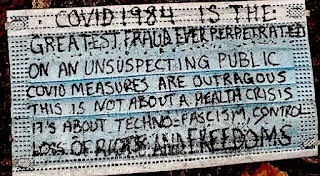[SOTT]: In 1633, Galileo was brought before the Inquisition for his demonstration that the earth is not fixed but revolves around the sun. This was a problem, obviously, because the ecclesiastical authorities believed their legitimacy rested on a claim to have an adequate grasp of reality, as indeed it did. Galileo had no interest in being a martyr, and recanted to save his skin. But in the lore of Enlightenment, he is said to have muttered under his breath, "but it does move!"
This anecdote has a prominent place in the story we tell about what it means to be modern. On one side, science with its devotion to truth. On the other side, authority, whether ecclesiastical or political. In this tale, "science" stands for a freedom of the mind that is inherently at odds with the idea of authority.
The pandemic has brought into relief a dissonance between our idealised image of science, on the one hand, and the work "science" is called upon to do in our society, on the other. I think the dissonance can be traced to this mismatch between science as an activity of the solitary mind, and the institutional reality of it. Big science is fundamentally social in its practice, and with this comes certain entailments.
As a practical matter, "politicised science" is the only kind there is (or rather, the only kind you are likely to hear about). But it is precisely the apolitical image of science, as disinterested arbiter of reality, that makes it such a powerful instrument of politics. This contradiction is now out in the open. The "anti-science" tendencies of populism are in significant measure a response to the gap that has opened up between the practice of science and the ideal that underwrites its authority. As a way of generating knowledge, it is the pride of science to be falsifiable (unlike religion).
Yet what sort of authority would it be that insists its own grasp of reality is merely provisional? Presumably, the whole point of authority is to explain reality and provide certainty in an uncertain world, for the sake of social coordination, even at the price of simplification. To serve the role assigned it, science must become something more like religion.
The chorus of complaints about a declining "faith in science" states the problem almost too frankly. The most reprobate among us are climate sceptics, unless those be the Covid deniers, who are charged with not obeying the science. If all this has a medieval sound, it ought to give us pause.
We live in a mixed regime, an unstable hybrid of democratic and technocratic forms of authority. Science and popular opinion must be made to speak with one voice as far as possible, or there is conflict. According to the official story, we try to harmonise scientific knowledge and opinion through education. But in reality, science is hard, and there is a lot of it. We have to take it mostly on faith. That goes for most journalists and professors, as well as plumbers. The work of reconciling science and public opinion is carried out, not through education, but through a kind of distributed demagogy, or Scientism. We are learning that this is not a stable solution to the perennial problem of authority that every society must solve.
The phrase "follow the science" has a false ring to it. That is because science doesn't lead anywhere. It can illuminate various courses of action, by quantifying the risks and specifying the tradeoffs. But it can't make the necessary choices for us. By pretending otherwise, decision-makers can avoid taking responsibility for the choices they make on our behalf.
Increasingly, science is pressed into duty as authority. It is invoked to legitimise the transfer of sovereignty from democratic to technocratic bodies, and as a device for insulating such moves from the realm of political contest.
Over the past year, a fearful public has acquiesced to an extraordinary extension of expert jurisdiction over every domain of life. A pattern of "government by emergency" has become prominent, in which resistance to such incursions are characterised as "anti-science".
But the question of political legitimacy hanging over rule by experts is not likely to go away. If anything, it will be more fiercely fought in coming years as leaders of governing bodies invoke a climate emergency that is said to require a wholesale transformation of society.
We need to know how we arrived here....<<<Read The Full Article Here>>>...
Welcome to "A Light In The Darkness" - a realm that explores the mysterious and the occult; the paranormal and the supernatural; the unexplained and the controversial; and, not forgetting, of course, the conspiracy theories; including Artificial Intelligence; Chemtrails and Geo-engineering; 5G and EMR Hazards; The Net Zero lie ; Trans-Humanism and Trans-Genderism; The Covid-19 and mRNA vaccine issues; The Ukraine Deception, Flat Earth, Tartaria ... and a whole lot more.
